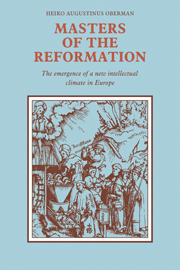Book contents
- Frontmatter
- Contents
- Preface
- Abbreviations
- Map
- PART I INTELLECTUAL RENEWAL
- 1 The ivory tower: the university as observatory
- 2 The impact of humanism: fact and fancy
- 3 The scholastic rift: a parting of the ways
- 4 The devotio moderna: movement and mystery
- 5 Patterns of thought on the eve of upheaval
- 6 The Augustine renaissance in the later Middle Ages
- PART II THE GRAPES OF WRATH
- PART III NEW JERUSALEM WITHIN THE OLD WALLS
- Student population at German universities 1385–1540
- Chronological outline
- Bibliography
- Index of names and places
- Index of modern authors
- Subject index
3 - The scholastic rift: a parting of the ways
Published online by Cambridge University Press: 07 October 2011
- Frontmatter
- Contents
- Preface
- Abbreviations
- Map
- PART I INTELLECTUAL RENEWAL
- 1 The ivory tower: the university as observatory
- 2 The impact of humanism: fact and fancy
- 3 The scholastic rift: a parting of the ways
- 4 The devotio moderna: movement and mystery
- 5 Patterns of thought on the eve of upheaval
- 6 The Augustine renaissance in the later Middle Ages
- PART II THE GRAPES OF WRATH
- PART III NEW JERUSALEM WITHIN THE OLD WALLS
- Student population at German universities 1385–1540
- Chronological outline
- Bibliography
- Index of names and places
- Index of modern authors
- Subject index
Summary
At the founding of the University of Tübingen the via moderna had already outgrown the stormy but inescapable phases of childhood and adolescence in which a movement discovers and develops its mature profile through contrast and definition. Karl Feckes even termed the modern way's ‘Venerabilis Inceptor’, William of Occam (†l349), a ‘Stürmer und Dränger’. But Occam's comprehensive programme found only limited realization in the first phase of the dissemination of nominalism.
Occam's thought had a twofold thrust and subsequent generations were unable to maintain the organic unity of this dual impulse. Existentially linked in Occam's person, his specific epistemological point of departure and his corporative ecclesiology each found a standard-bearer, the one in the lecture hall, the other in the convent. The radical Franciscans, or Fraticelli, could easily identify with his position regarding the church without paying much attention to what they considered to be his overly speculative epistemology. And Occam's earliest students in England could absorb completely his initiatives toward a new philosophical theology while remaining untouched by his Franciscan spirit shaped in the quarrel over monastic poverty. Indeed, their indifference often gave way to an unmistakable aversion to Occam's ecclesiological writings.
It simply cannot be denied that Occam, as a disciple of St Francis and defender of the Franciscan ideal of poverty, favoured a basic renunciation of power on the part of the church and called for opposition to the exaggerated conception and the tyrannical application of spiritual power which he observed in the Avignon papacy.
- Type
- Chapter
- Information
- Masters of the ReformationThe Emergence of a New Intellectual Climate in Europe, pp. 23 - 44Publisher: Cambridge University PressPrint publication year: 1981

